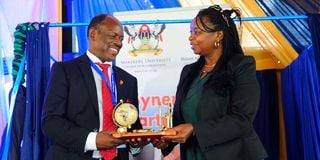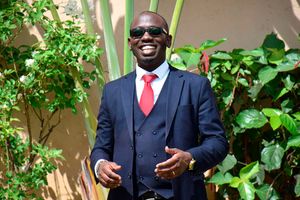Premium
Desiring and fearing to go to Makerere as Ukraine bleeds

Mount Kenya University directors board member Jane Nyutu presents a gift to Makerere University Vice Chancellor Prof Barnabas Nawangwe when MKU and Makere University signed an MOU.
What you need to know:
- At Makerere Hill, the preparations for the centenary celebrations are overshadowed by the monumental task of rebuilding the famous Main Building.
- Late last week, the VC announced that a contract had been awarded and the works would begin anytime now.
I am yet to seek a formal interview with Professor Barnabas Nawangwe, the “man from Busia”, as I endearingly think of him. Prof Nawangwe, as you might know, is the Vice-Chancellor of Makerere University. He has both the privilege and the challenge of leading that august institution in its centenary celebrations throughout this year.
As I mentioned to you, I would like to ask the Vice-Chancellor how Kenya’s top Makerereans, and other eminent East African alumni of the institution, can actively participate in the celebration. I realised, after my mention of a few names of such famous Makerereans, that the exercise is invidious. It is impossible to do justice to the hefty list of such names and their achievements.
I was, for example, laughing at myself for failing to put my teacher, history icon and historical Makererean, Prof Bethwell Allan Ogot, at the top of the list of celebrants. Then several of you wrote to alert me to many others that should have been high in the mentions, like the luminary scientist, Prof Shem Wandiga of the African Academy of Sciences. I will keep looking for a forum in which I can appropriately acknowledge more topflight Kenyan Makerereans.
Back to Prof Nawangwe, my hesitation about approaching him just now rises from my feeling that he must be under considerable stress from at least two current situations close to him. The first is right there on the one hundred-year campus while the other is geographically far away from Uganda but historically close to the good Professor’s heart.
At Makerere Hill, the preparations for the centenary celebrations are overshadowed by the monumental task of rebuilding the famous Main Building, with its iconic “Ivory Tower”, destroyed in a mysterious inferno in November 2020. Late last week, the VC announced that a contract had been awarded and the works would begin anytime now. A shattering part of the announcement was that the entire building, which has stood as a charred, blackened ruin since the fire disaster, would have to be completely demolished and rebuilt from scratch.
Monumental structure
This ended the fond hopes that many Makerereans and other observers had nursed that the old building could be rehabilitated and renovated without razing it to the ground. This was in view of the very strong foundation on which it had been raised and the good old world construction techniques behind it. Now, that turns out to have been wishful thinking, disproved by expert investigations.
Still, the mind boggles at the reality of having this monumental structure, which has always been a landmark to all of us, knocked down, blown up or in any other way pulverised and reduced to a heap of rubble. This is one of the reasons I am avoiding going up to the Hill all of this week. Much as one might want to witness the historic demolition live, it is not easy to predict how one’s emotions would hold out before it. Yet our VC and his team have to be there to supervise the grim operation.
To make matters more sensitive, Prof Nawangwe is himself an architect, indeed one of the founding academics of Makerere’s Department of Architecture, which is now part of the College of Engineering, Design, Art and Technology. Although he was not there when the condemned building was erected, he appreciates better than most of us laypeople the imagination, skill and sheer labour that goes into the creation of such historic buildings. He seems to be optimistic that the new building to be raised on the site will reflect the beauty and dignity of its predecessor, but the nostalgia just does not go away.
Another heartache for Professor Nawangwe must be the war in Ukraine. As I hinted earlier, distant as that land is from Uganda, it is very familiar to our VC. He received most of his higher academic training and qualifications from universities and institutions there. I will not pretend to understand or represent the Prof’s feelings about the horrendous developments in that unfortunate land.
Ukraine tragedy
But we, who have never been there, feel traumatised by the images and stories of bodies of women and children lying in the streets, historic buildings and whole neighbourhoods strafed and reduced to rubble. It should not be too difficult to guess at the sentiments of a man who knew and called those neighbourhoods and buildings home and school for several years. Although I am considering the feelings of another person, the Ukraine tragedy raises two main thoughts in me, which are always close to my mind.
The first is the incredibly close interconnectedness of our world. You have often heard me say that I, like many of you, have relatives and friends in practically every part of the world. This is not a boast or an exaggerated claim. It is simple acknowledgement of a fact of our times, the age of the “global village”, as the Canadian communication scholar, Marshall McLuhan, predicted back in the 1960s. I, for example, have a brother who studied in the former Soviet Union, in Byelorussia to be exact, and now lives with his family in Sweden.
If I have a VC trained in Ukraine, and we have a leading presidential candidate also trained in the former Soviet Union, can we afford an outlook that goes no further than Muranga, Muhoroni or Kwale? Whatever happens “out there” is happening “right in here” and affects us directly.
Finally, the brutality and violence wreaked by people upon others of practically the same stock, and in so-called “advanced” countries, underlines the never-ending need for “humanising” our people. A STEM (science-technology-engineering-mathematics) based education and culture may enable us to wonderfully manufacture, deploy and direct our stealth bombers and hypersonic missiles. But without a tempering human, social and spiritual “civilising” content, those scientific wonders will only lead us to where we are now, with mass murders, unprecedented displacements and flattened cities.
I will not mention the already threatened nuclear scourge, which “only the worms can win”.
Prof Bukenya is a leading East African scholar of English and [email protected]





